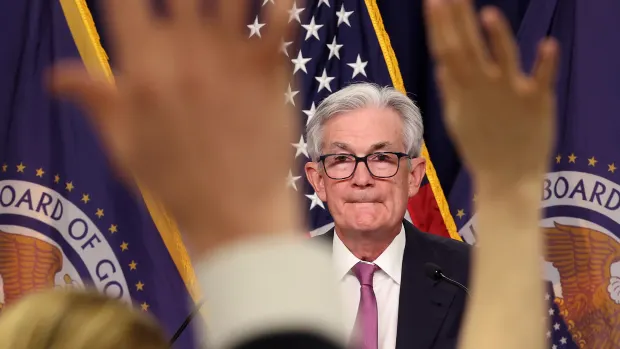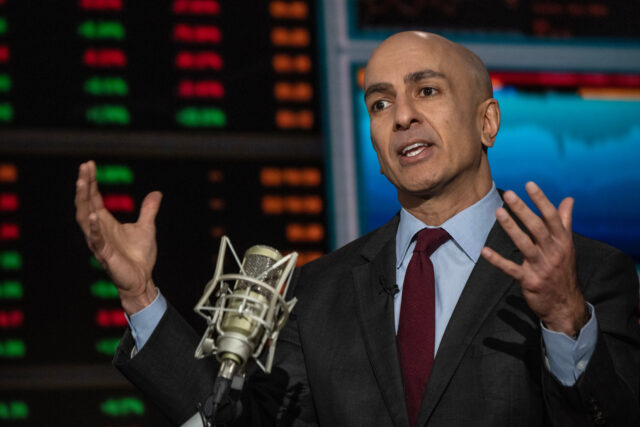from CNBC Television
Think Inflation is Done? Think Again!
by Alasdair MacLeod
Gold Money
 A lethal combination of budget deficits and trade sanctions are going to be reflected in increasing price inflation for the US. And where the US goes, the rest of us follow.
A lethal combination of budget deficits and trade sanctions are going to be reflected in increasing price inflation for the US. And where the US goes, the rest of us follow.
In this article I focus on two reasons why inflation will rise leading to higher, not lower, interest rates and bond yields. The first is the destruction of credit’s value through its non-productive expansion, mainly by governments running budget deficits. The second has had almost no attention but is at least as serious: the consequences of the repatriation of supply chains being accelerated by trade tariffs and sanctions. I shall briefly comment on the first before turning my attention to the second.
Hyperinflation and the Destruction of Human Personality
by Joseph T. Salerno
Mises.org
 Economists and historians have clearly shown that the destruction of the value and function of money by hyperinflation makes economic calculation impossible and leads to economic and social disintegration and widespread poverty. What is not so clearly understood, even by many economists, is that during periods of rapid inflation, the inability to economically calculate undermines the very nature of property and causes a withering of the human personality, which is intimately connected with property ownership. By eliminating the means of appraising and rationally allocating one’s property, hyperinflation eliminates the very basis of independent human existence and personality under a system of social cooperation. The inevitable result is the dissolution of the society of voluntary contract and its replacement by a hegemonic order in which property and personality are collectivized.
Economists and historians have clearly shown that the destruction of the value and function of money by hyperinflation makes economic calculation impossible and leads to economic and social disintegration and widespread poverty. What is not so clearly understood, even by many economists, is that during periods of rapid inflation, the inability to economically calculate undermines the very nature of property and causes a withering of the human personality, which is intimately connected with property ownership. By eliminating the means of appraising and rationally allocating one’s property, hyperinflation eliminates the very basis of independent human existence and personality under a system of social cooperation. The inevitable result is the dissolution of the society of voluntary contract and its replacement by a hegemonic order in which property and personality are collectivized.
The central role of money and property in the formation of the individual human personality under the division of labor has yet to be investigated in any depth, and I will not attempt to do this here. However, I will note that in speaking of the human personality, I am referring to what has been called, usually derisively, the “bourgeois personality.”
Inflation Pressures Lingering From Pandemic Are Keeping Fed Rate Cuts On Pause
by Christopher Rugaber
AP News
WASHINGTON (AP) — Hopes for interest rate cuts this year by the Federal Reserve are steadily fading, with a stream of recent remarks by Fed officials underscoring their intention to keep borrowing costs high as long as needed to curb persistently elevated inflation.
A key reason for the delay in rate cuts is that the inflation pressures that are bedeviling the economy are being driven largely by lingering forces from the pandemic — for items ranging from apartment rents to auto insurance to hospital prices. Though Fed officials say they expect inflation in those areas to eventually cool, they’ve signaled that they’re prepared to wait as long as it takes.
Inflation, Government Spending, and the Importance of Gold
by Money Metals
GoldSeek
 This episode of Money Metals’ Midweek Memo, hosted by Mike Maharrey, delves into the impact of government actions on the economy, the role of the Federal Reserve in inflation, and the strategic importance of investing in gold and silver.
This episode of Money Metals’ Midweek Memo, hosted by Mike Maharrey, delves into the impact of government actions on the economy, the role of the Federal Reserve in inflation, and the strategic importance of investing in gold and silver.
Government Incompetence or Malevolence?
Maharrey begins by highlighting the inefficiencies and frustrations caused by government interventions, drawing parallels to everyday experiences like the DMV or navigating Medicare. He questions whether the government’s missteps are due to sheer incompetence or malevolent intent, concluding that it’s likely a mix of both.
Inflation Pressures Are Keeping Fed Rate Cuts On Pause
by AP
Breitbart.com
 WASHINGTON (AP) — Hopes for interest rate cuts this year by the Federal Reserve are steadily fading, with a stream of recent remarks by Fed officials underscoring their intention to keep borrowing costs high as long as needed to curb persistently elevated inflation.
WASHINGTON (AP) — Hopes for interest rate cuts this year by the Federal Reserve are steadily fading, with a stream of recent remarks by Fed officials underscoring their intention to keep borrowing costs high as long as needed to curb persistently elevated inflation.
A key reason for the delay in rate cuts is that the inflation pressures that are bedeviling the economy are being driven largely by lingering forces from the pandemic — for items ranging from apartment rents to auto insurance to hospital prices. Though Fed officials say they expect inflation in those areas to eventually cool, they’ve signaled that they’re prepared to wait as long as it takes.
Yet the policymakers’ willingness to keep their key rate at a two-decade peak — thereby keeping costs painfully high for mortgages, auto loans and other forms of consumer borrowing — carries its own risks.
This Just Collapsed to Lowest Level in 23 Years, Plus More “Transitory” Inflation On the Way
from King World News
 This just collapsed to the lowest level in 23 years. Plus a look at more “transitory”inflation.
This just collapsed to the lowest level in 23 years. Plus a look at more “transitory”inflation.
May 30 (King World News) – Peter Boockvar: Pending home sales in April fell a sharp 7.7% m/o/m, well more than the anticipated 1% decline. This takes the index to just .5 pt from the lowest level on record dating back to 2001.
Pending Home Sales Collapse To Lowest In 23 Years
Price Inflation Isn’t an Accident; It’s a Policy
by Mike Maharrey
GoldSeek
 If you listen to government officials and central bankers talk about price inflation, you might think they don’t have the foggiest idea of what caused it. It might have been supply chain problems, or perhaps it was Putin’s fault. Maybe greedy corporations are jacking up prices. Or it could be that consumer expectations are driving price inflation higher.
If you listen to government officials and central bankers talk about price inflation, you might think they don’t have the foggiest idea of what caused it. It might have been supply chain problems, or perhaps it was Putin’s fault. Maybe greedy corporations are jacking up prices. Or it could be that consumer expectations are driving price inflation higher.
They can’t tell you exactly why prices keep rising, but trust them… they’re doing their best to stop it!
But this is all deflection and obfuscation. They’re causing price inflation. When they point fingers everywhere else, they’re either unforgivably ignorant or they’re lying.
The $150,000 Housekeeper: Wage Inflation Kicks Into Second Gear
by Charles Hugh Smith
Of Two Minds
 If we add up all these tidal forces, the conclusion is self-evident: labor “inflation” has just shifted into second gear.
If we add up all these tidal forces, the conclusion is self-evident: labor “inflation” has just shifted into second gear.
One of the lesser known manifestations of the inflationary crisis in early-1920s Germany was rampant wage inflation. Bourgeois burghers complained bitterly about the high wages being demanded–and received–by tradespeople. This reversal of fortune–wage earners gaining some power over the upper-middle class and wealthy–was naturally upsetting to those accustomed to wielding power over mere laborers.
But when the roof is leaking or the car won’t start, negotiations favor the few who can actually fix the problem. Despite the overblown hoopla about AI, ChatGPT can’t fix leaky pipes or roofs, nor will it ever be able to do so because all it can actually do is play around with words. Since we can’t repair a leaky roof or prune a tree with words, Large Language Model (LLM) – Machine Learning AI is useless in the real world.
Fed Rate Cuts Face Big Reset On Renewed Inflation Risks
The economy continues to roll, jobs are plenty and consumers are getting a bit more upbeat. That’s bad news for interest-rate-cut bets.
by Martin Baccardax
The Street
 The U.S. economy continues to defy both calls for a slowdown and suggestions that a recession is on the horizon, as a resilient job market and solid consumer spending continue to power stronger-than-expected growth prospects.
The U.S. economy continues to defy both calls for a slowdown and suggestions that a recession is on the horizon, as a resilient job market and solid consumer spending continue to power stronger-than-expected growth prospects.
The surprising strength, however, has deepened concerns that the Federal Reserve, which is focused on stubborn inflation pressures, will delay any move to lower borrowing costs over the coming months and could scrap rate cuts altogether until early next year.
Minutes from the central bank’s May policy meeting, published last week, noted a willingness to “tighten policy further should risks to inflation materialize.” But the document otherwise suggested a “wait-and-see” preference to determine any near-term interest-rate moves.
Fed President Kashkari: Immigration Surge Keeps Inflation and Interest Rates Sky-High
by John Carney
Breitbart.com
 Surging immigration is keeping inflation and interest rates high, Fed honcho Neel Kashkari said in an interview with the Telegraph.
Surging immigration is keeping inflation and interest rates high, Fed honcho Neel Kashkari said in an interview with the Telegraph.
Kashkari, who runs the Federal Reserve Bank of Minneapolis, said he’s not ready to consider cutting rates until he sees “several months of real progress on inflation.” The flood of immigrants, he argued, is hindering that progress.
U.S. borrowing costs are likely to stay put for “an extended period of time,” Kashkari warned.
He’s particularly freaked out by the booming demand for housing, which just won’t cool off despite sky-high rates.
